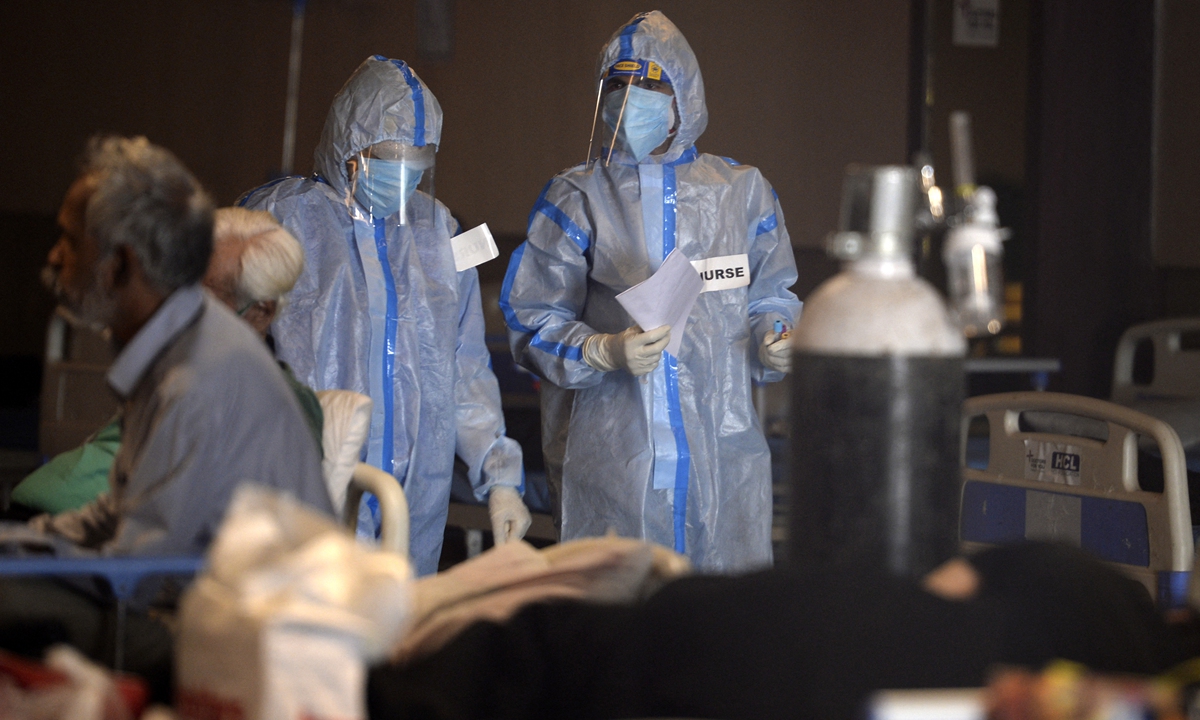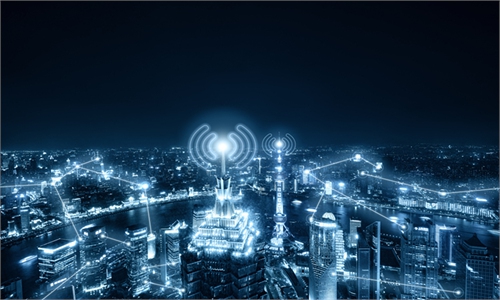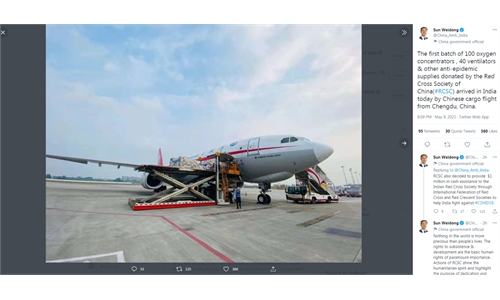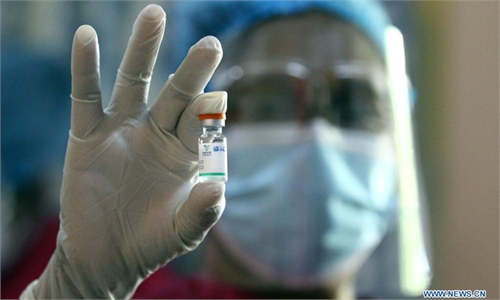Modi thwarted amid COVID-19 crisis
New Delhi's high-profile 'vaccine diplomacy' bankrupt: experts

Health workers wearing protective gear stand next to a COVID-19 patient inside a banquet hall temporarily converted into a COVID-19 care center in New Delhi, India, on May 10. Photo: AFP
Faced with growing calls for a national lockdown and pressure from the opposition, Indian Prime Minister Narendra Modi has yet to find the right balance between economic recovery and epidemic control.
Although the Modi administration's poor performance in epidemic handling may not worry him and his party's domestic standing for the time being, the disastrous new surge has caused a rift between India and other countries, experts said.
Sonia Gandhi, the head of major opposition Indian National Congress (INC), said at the Congress Working Committee meeting Monday that India's health system has collapsed and vaccination coverage is "woefully short of need," saying the Modi government abdicated its responsibilities, when some states have already announced a complete lockdown.
India recorded 366,161 new COVID-19 cases and 3,754 deaths on Monday, the first time that the daily rise was less than 400,000 after four straight days. India's total infections stands at 22.66 million, with over 246,000 deaths. But the actual figures could be far higher, media said.
Modi, whose ruling party Bharatiya Janata Party (BJP) announced in February that India had defeated the virus under his "able, sensitive, committed and visionary" leadership, was urged to impose a nationwide lockdown as he did amid the first wave in 2020.
Modi was also criticized for allowing gatherings at a huge religious festival and holding large election rallies for BJP in West Bengal amid surging cases. The Institute for Health Metrics and Evaluation estimated that India will see one million COVID-19 deaths by August, Al Jazeera reported.
Modi's BJP was defeated in the West Bengal election, which experts said was partly a reflection of people's anger at the poor COVID response of the Modi government.
With Modi's BJP dominance, opposition parties such as INC have not yet been able to challenge despite their disastrous handling of the epidemic, Hu Zhiyong, a research fellow at the Institute of International Relations of the Shanghai Academy of Social Sciences, told the Global Times on Monday.
Qian Feng, director of the research department at the National Strategy Institute at Tsinghua University, told the Global Times on Monday that although the BJP is still the most powerful party, the election results mean that the BJP's attempts to build on its electoral strength to extend its reach in the regional states have been checked.
If Modi and BJP do not focus on controlling the epidemic and social governance, the voices of the opposition and discontent will grow, Qian said.
Some analysts noticed that India may become the target of covert criticism from some Western countries. With their own country-first policy, the new wave in India represents a risk to imported infections, and an increased uncertainty and difficulty in the global restart.
Aside from that, the West's insincere response will also embarrass the Modi government, which has championed high-profile pro-Western diplomacy, they said.
India's so-called allies were not offering sincere help, but China, whose relations were beset by border issues with India, offered the most help, said Hu, noting that India should think more about how to seek common development with China.
As humanitarian support to India, the Red Cross Society of China (RCSC) donated the first batch of 100 oxygen concentrators, 40 ventilators and other anti-epidemic supplies. The donation arrived in India on Sunday. The shipment was the first batch of anti-epidemic supplies donated by the RCSC to India.
The RCSC has also decided to provide $1 million in cash in assistance to the Indian Red Cross Society.
"Defeat COVID-19, we are all together" was printed on boxes containing the first batch of the supplies.
On India's request to lift restrictions on exporting raw materials for vaccines, US State Department spokesperson Ned Price said in late April that the first obligation is to the US people, media reported.
It looks like India's relations with the US and the West are warming up, but the devastating epidemic in India exposed a rift between India and the US, Qian said.
The devastating new surge also ruined Modi's "vaccine diplomacy," Hu said.
Analysts said that at the early stage, India's vaccine diplomacy, trying to win neighboring countries over from China, an imaginary competitor, was extremely obvious. But the country has become the biggest source of concern in terms of exporting cases and the weakest link in the economic recovery of South Asia.
As the biggest vaccine manufacturing country, India did not get enough doses for self-protection. It exported over 66 million doses from January to April to orbit countries in South Asia to outline its prestige. As of May 2, only two percent of India's 1.4 billion people have been fully inoculated, Aljazeera reported.
India is "Trumpian" in its response to the epidemic: trying to balance economic recovery with fighting the epidemic, but failing to do either. With hundreds of thousands of new cases a day, and an economic decline, this wave could set India's economy back 20-30 years, Hu said.
Under thepressure of economic recovery, the Indian government has not been able to strictly seal off cities, which is a formidable challenge for the Indian government and its people, Qian said, comparing the new India wave to the 2020 Australia bushfire.




